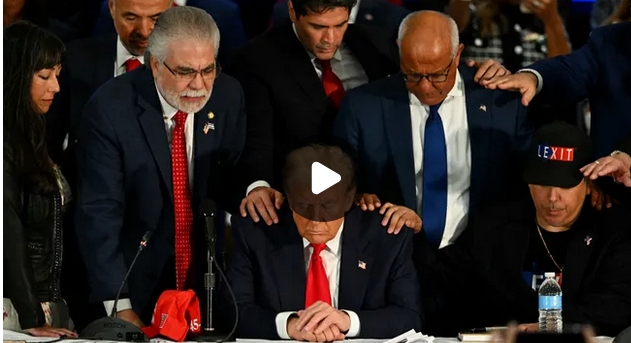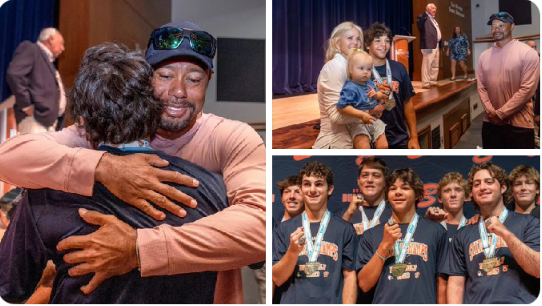Opinion: Christian nationalists may elect Trump. And that has me worried.
The Republican Party has long coveted the evangelical Christian voting bloc. Donald Trump does, especially. The influence of Christianity has declined in America in recent years, but a Gallup poll published in March showed that 68% of Americans still identify as Christian. In 2020, 71% of white Americans who attended church regularly voted for Trump….
The Republican Party has long coveted the evangelical Christian voting bloc. Donald Trump does, especially.
The influence of Christianity has declined in America in recent years, but a Gallup poll published in March showed that 68% of Americans still identify as Christian. In 2020, 71% of white Americans who attended church regularly voted for Trump. In 2016, white evangelicals made up one fifth of all voters − and they overwhelmingly supported Trump over Hillary Clinton (77% to 16%).
According to the Pew Research Center, 85% of white evangelicals favor the GOP in 2024.
In recent years, many evangelical voters have moved from backing a particular candidate or party into Christian nationalism. (Christianity Today defines Christian nationalism as the “belief that the American nation is defined by Christianity, and that the government should take active steps to keep it that way.”)
But God, Trump and the Republican Party are not synonymous.
’11th Hour Faith Leaders Meeting’
On Monday, pastors, including prominent evangelical leader Franklin Graham, rallied for Trump at a Christian outreach event that the former president’s campaign called the “11th Hour Faith Leaders Meeting” in Concord, North Carolina.
“This election is about whether we are a secular nation or one nation under God,” said Dr. Ben Carson, faith chairman of the Trump reelection campaign.
Opinion:Trump might win this election. What does that say about the Democratic Party?
Trump discussed how he believes Christianity intertwines with his campaign: “My faith took on new meaning on July 13 in Butler, Pennsylvania, where I was knocked to the ground essentially by what seemed like a supernatural hand. And I would like to think that God saved me for a purpose, and that’s to make our country greater than ever before.”
This has become a common political sentiment among millions of Christians.
Latino community leaders pray with Republican presidential nominee Donald Trump at a roundtable discussion in Miami on Oct. 22, 2024.
At the North Carolina event, Guillermo Maldonado, a pastor from Miami and longtime Trump ally, told attendees this election wasn’t just about American politics.
“You know, we’re now in spiritual warfare,” Maldonado said. “It’s beyond warfare between the left and the right. It’s between good and evil. There’s a big fight right now that is affecting our country and we need to take back our country.”
Evangelicals line up with Republicans
Many evangelicals align with the idea that Christians must vote for a Republican, one who will return America to a time when God was at the center of public life.
I’m a Christian with a deep interest in politics, but this kind of language about Christianity, politics and Trump concerns me.
Many evangelical Christians are single-issue voters. They vote for the candidate who is pro-life, which is usually the Republican.
Opinion:Harris woos women but has lost men. It may cost her the election.
While Harris and Trump have debated abortion, neither can actually do much about it now that the Supreme Court has overturned Roe v. Wade. It’s possible that an issue that once galvanized Christians to vote may now keep them at home. That would be a stunning turn of events for the pro-life movement.
Trump’s presence on the ballot raises other questions: What about when the Republican Party presidential nominee is pro-life but also is a womanizer, a misogynist and a convicted felon?
In a sermon this month, Dallas megachurch pastor Josh Howerton encouraged his congregation to stop looking for perfection in presidential candidates, saying Christians should vote for the person who embraces their values most.
“Any Christian that’s got a Bible open and their brain working ought to be looking at both of the candidates we’re looking at and going, ‘Man, I see some flaws in both things I got in front of me,'” Howerton said. “Jesus is not on the ballot, guys. Get over it.”
What should Christians do?
I don’t agree with things Howerton has said in the past, but I do agree with his statement about voting. But not for the most obvious reason.
It’s not just that Christians need to realize Jesus isn’t on the ballot, or that they should stop looking for perfection in their political candidates. That is true. (Although, pretty much everyone knows our political candidates are flawed.)
What’s more important is the idea that Christians need to stop looking to a politician to do only what God can do. And that Christians stop looking to God to reflect their political beliefs. Those roles are not interchangeable or intertwined.
I believe voting is a right and a privilege. Millions of people in other countries, including people of faith, would love to have the right to vote, but don’t. We should exercise that right, and we should do so carefully.
But I say that with caution because of Republicans who are evangelical Christians and who have a strong tendency toward Christian nationalism. Especially in Texas, where I live.
In the 1980s, under the influence of the Moral Majority and similar organizations, many Christians began to believe that God favors a specific political party, especially on issues like abortion and LGBTQ+ rights.
Democratic presidential nominee Kamala Harris speaks at a Sunday service at New Birth Missionary Baptist Church on Oct. 20, 2024, in Stonecrest, Ga.
I hate to burst anyone’s bubble, but God is not a Republican or a Democrat. He is the Savior, not a politician.
To confine the God of the universe to the petty entanglements of American politics is to reject the many attributes of a supreme God who is omniscient, omnipotent and omnipresent. The Bible says that he is above all things, and that his ways are higher than our ways.
It’s tempting to be apathetic about politics when the presidential candidates are disappointing. Yet, we have a responsibility to our nation’s electoral process. But too many Christians tie God to our political system, and that’s not good or right.
Nicole Russell is an opinion columnist with USA TODAY. She lives in Texas with her four kids. Sign up for her newsletter, The Right Track, and get it delivered to your inbox.






